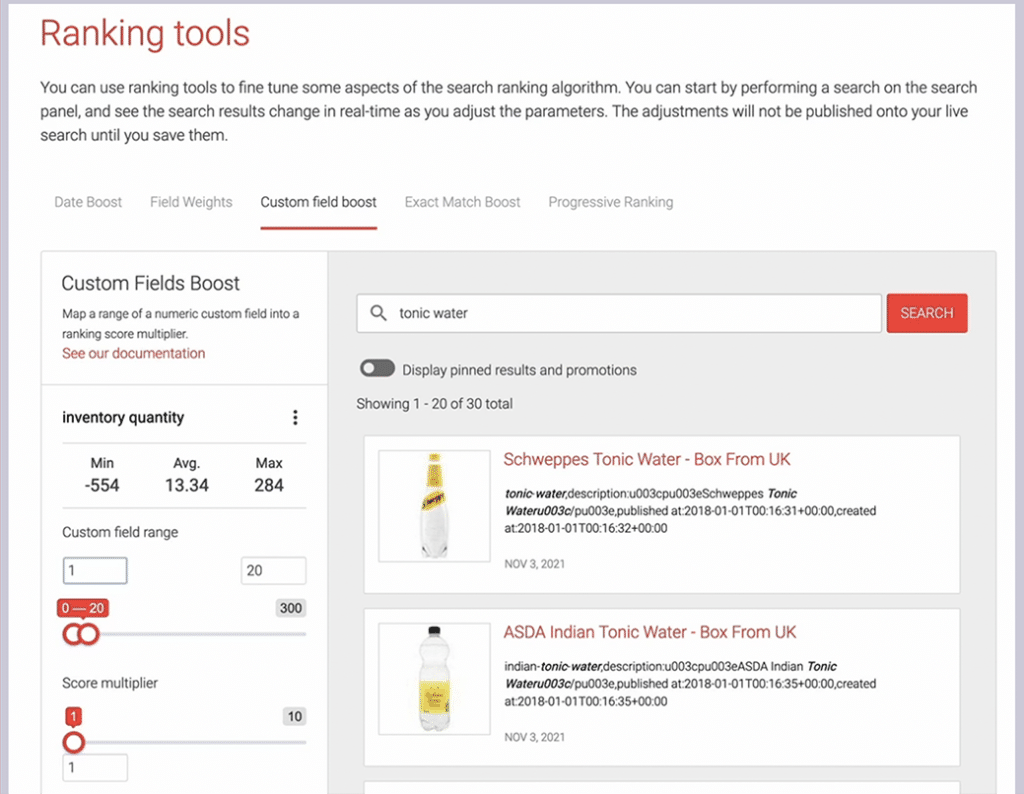Keyword cannibalization is a term that has gained significant attention in the e-commerce SEO realm, and for good reason. As we’ve discussed in our previous blog post, “Keyword Cannibalization: The Covert Danger to Your E-commerce SEO,” it’s a challenge that many e-commerce sites face, with repercussions that extend beyond just SEO rankings. In this article, we’ll shift our focus from understanding the problem to implementing solutions. Specifically, we’ll explore how site search can become an important tool in preventing keyword cannibalization and ensuring that your e-commerce platform not only ranks well but also offers an optimized user experience.
The impact of keyword cannibalization on e-commerce websites
While keyword cannibalization might sound like technical jargon exclusive to SEO experts, its implications are far-reaching, especially for e-commerce businesses. Keyword cannibalization can potentially seep into the very fabric of a website’s user experience, influencing how visitors navigate, interact, and ultimately decide to make a purchase.
Here’s a closer look at how keyword cannibalization on e-commerce websites can subtly, yet significantly, disrupt this journey:
Confusing navigation:
When multiple pages target the same keyword, users might land on a page that doesn’t quite match their intent. This can lead to confusion, increased bounce rates, and a decrease in user satisfaction.
Diluted conversions:
Instead of guiding users to a primary product or landing page optimized for conversions, traffic gets spread thin across multiple pages. This dilution can lead to missed sales opportunities.
Compromised credibility:
Consistency is key in e-commerce. When users encounter multiple pages with similar or overlapping content, it can raise questions about the website’s organization and credibility.
Challenges in content strategy:
For content managers and marketers, keyword cannibalization can create challenges in content planning and promotion. Without a clear strategy, efforts can become redundant.
Understanding the problem is just the first step. The real challenge lies in implementing effective strategies to prevent it.
Tips and best practices to prevent keyword cannibalization on e-commerce websites
Keyword cannibalization might sound daunting, but with the right strategies in place, it’s a challenge that can be effectively managed. Here are some actionable tips and best practices to ensure your e-commerce website remains robust and user-centric:
- Conduct Regular Content Audits: Periodically review your website’s content to identify overlapping keywords. Tools like AddSearch can help streamline this process, ensuring you have a clear content map.
- Use Canonical Tags: If you have multiple pages with similar content, use canonical tags to indicate to search engines which page should be considered the “main” one.
- Restructure Your Website: Consider merging pages that target the same keywords. This not only prevents cannibalization but also provides users with a more comprehensive resource.
- Optimize Internal Linking: Ensure that internal links on your website are pointing to the most relevant and authoritative pages for specific keywords.
- Stay Updated with Search Trends: User search behavior evolves. Regularly update your keyword strategy based on current trends and user intent.
- Implement a Dynamic Site Search Solution: Tools like AddSearch can adapt to user behavior, ensuring that the most relevant content is always surfaced, reducing the chances of cannibalization.
By proactively implementing these strategies, you can ensure that your e-commerce website remains optimized, user-friendly, and free from the pitfalls of keyword cannibalization.
Preventing keyword cannibalization on e-commerce websites with AddSearch
Site search is a critical component of e-commerce websites, guiding users to the products or information they seek. However, the wrong search solution or improper implementation can inadvertently contribute to keyword cannibalization. Here’s how AddSearch steps in to transform this challenge into an opportunity:
Intelligent search algorithms:
AddSearch employs advanced algorithms that prioritize the most relevant results. Instead of multiple pages competing for attention, users are directed to the most pertinent product or content.
Personalization:
AddSearch’s personalization features ensure that search results are tailored to individual user behaviors and preferences. This reduces the chances of users encountering irrelevant or competing product pages.
Real-time indexing:
As you update product listings or content, AddSearch indexes these changes in real time. This ensures that outdated or redundant pages don’t cannibalize newer, more relevant content.
Insightful analytics:
With AddSearch’s analytics, you can gain insights into search behaviors and trends. If certain products or pages are consistently overshadowing others, you can make informed decisions on content optimization or restructuring.
Customizable ranking:
AddSearch allows you to manually adjust the ranking of search results. If you notice potential cannibalization, you can set specific pages or products to rank higher for particular queries.

Seamless integration:
AddSearch integrates effortlessly with various CMS platforms, ensuring that your site search is always aligned with your overall content strategy.
By integrating AddSearch, e-commerce platforms can ensure that their internal search functions not only enhance the user experience but also act as a robust line of defense against keyword cannibalization.
Case study: elevating ESAB’s e-commerce experience with AddSearch
ESAB, a global leader in the welding and cutting industry, recognized the need to optimize its online product discovery process. With a vast range of products, The goal was clear: help customers find exactly what they need with ease. Turning to AddSearch, ESAB found the solution they were looking for, and the results spoke for themselves:
- Streamlined Product Discovery: AddSearch’s intelligent algorithms ensured that ESAB’s customers were consistently directed to the most pertinent product pages based on their queries, enhancing navigation and reducing potential overlaps.
- Boosted Conversions: A more intuitive and efficient search experience led to a noticeable increase in conversions, as customers spent less time searching and more time engaging with relevant products.
- Insightful User Behavior Analytics: Through AddSearch’s analytics dashboard, ESAB could delve deep into user search patterns, allowing them to refine their content and product placement strategies.
- Optimized for All Devices: Recognizing the diverse ways their customers accessed their site, ESAB benefited immensely from AddSearch’s seamless mobile optimization.
- Enhanced User Satisfaction: With faster, more accurate search results, user satisfaction levels saw a marked improvement.
Through their partnership with AddSearch, ESAB transformed their e-commerce journey, making product discovery not just a process, but a breeze.
Delve deeper into ESAB’s success story here.
Conclusion
ESAB’s collaboration with AddSearch demonstrates the transformative impact of a streamlined product discovery process on e-commerce success. Meanwhile, challenges like keyword cannibalization continue to underscore the need for such optimization. Enhanced user satisfaction, better conversions, and increased engagement are just a few benefits businesses can reap. As businesses navigate the complexities of online shopping, solutions like AddSearch prove invaluable in ensuring a seamless and effective customer experience.
If you’re grappling with the challenges of keyword cannibalization and are seeking a comprehensive, user-friendly solution, look no further. Try AddSearch today and experience firsthand how our platform can revolutionize your e-commerce site’s search functionality. Get in touch for a personalized demo and take the first step in optimizing your e-commerce platform for success.
Experience the Best in Search Solutions with AddSearch – Top Rated on SourceForge! Click for Your Free, Personalized Demo Now.





